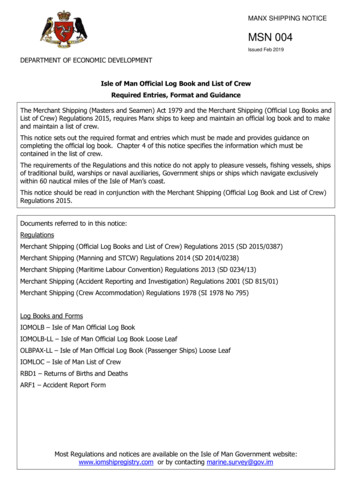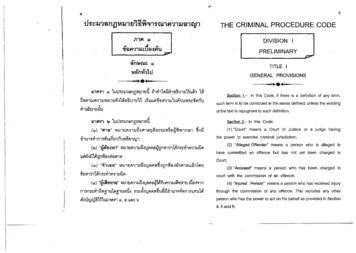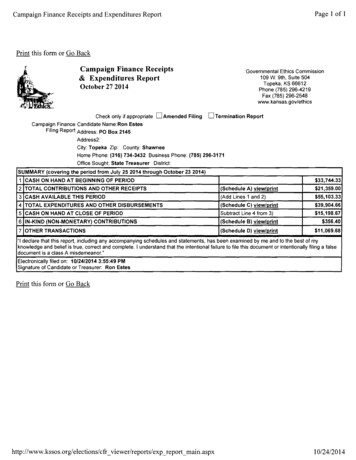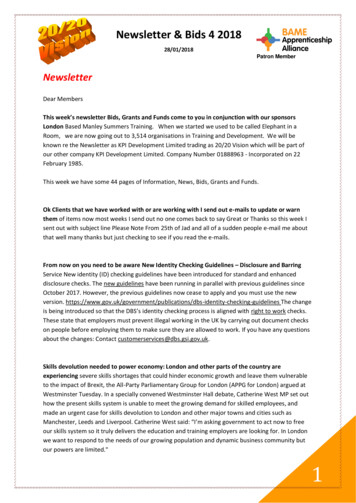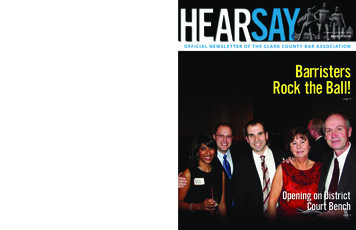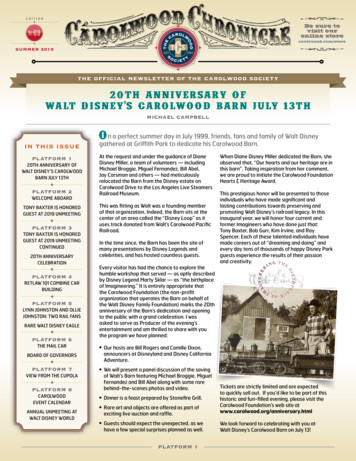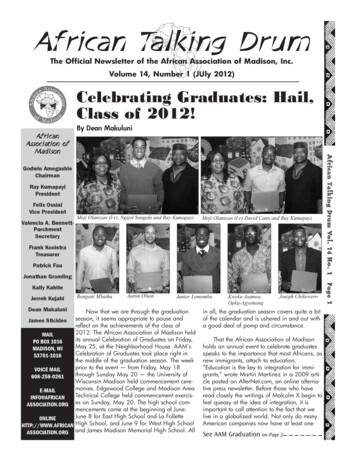
Transcription
African Talking DrumThe Official Newsletter of the African Association of Madison, Inc.Volume 14, Number 1 (JUly 2012)Celebrating Graduates: Hail,Class of 2012!By Dean MakuluniGodwin AmegashieChairmanRay KumapayiPresidentFelix OssialVice PresidentValencia A. BennettParchmentSecretaryMoji Olaniyan (l-r), Ngijol Songolo and Ray KumapayiMoji Olaniyan (l-r) David Cann and Ray KumapayiFrank KooistraTreasurerPatrick FauJonathan GramlingJerreh KujabiDean MakaluniBongani MbathaAaron OlsonJunior LomombaNow that we are through the graduationit seems appropriate to pause andseason,James Sticklesreflect on the achievements of the class of2012. The African Association of Madison heldMAILits annual Celebration of Graduates on Friday,PO BOX 1016May 25, at the Neighborhood House. AAM’sMADISON, WICelebration of Graduates took place right in53701-1016the middle of the graduation season. The weekprior to the event — from Friday, May 18VOICE MAILthrough Sunday May 20 — the University of608-258-0261Wisconsin Madison held commencement ceremonies. Edgewood College and Madison AreaE-MAILTechnical College held commencement exercisINFO@AFRICANASSOCIATION.ORG es on Sunday, May 20. The high school commencements came at the beginning of June:June 8 for East High School and La FolletteONLINEHTTP://WWW.AFRICAN High School, and June 9 for West High SchoolASSOCIATION.ORG and James Madison Memorial High School. AllKweku AsamoaOpku-AgyemangJoseph Chikoweroin all, the graduation season covers quite a bitof the calendar and is ushered in and out witha good deal of pomp and circumstance.That the African Association of Madisonholds an annual event to celebrate graduatesspeaks to the importance that most Africans, asnew immigrants, attach to education.“Education is the key to integration for immigrants,” wrote Martin Martinez in a 2009 article posted on AlterNet.com, an online alternative press newsletter. Before those who haveread closely the writings of Malcolm X begin tofeel queasy at the idea of integration, it isimportant to call attention to the fact that welive in a globalized world. Not only do manyAmerican companies now have at least oneSee AAM Graduation on Page 2Page 1Kally KahiteAfrican Talking Drum Vol. 14 No. 1AfricanAssociation ofMadison
African Talking Drum Vol. 14 No. 1Page 2AAM Graduation From Page 1foot outside the United States, but also most immigrantshave one foot here and the other in their original homeland. Education is about the acquisition of skills andknowledge to enable one to make productive contributions to communities here and at home in a world inwhich new technologies are irrevocably changing thenature of work, thought, and social relationships.Education is about the acquisition of knowledge thatenables one to negotiate the different worlds to whichone belongs.Our celebration recognized 27 graduates. Othernames were unfortunately brought forward too late to beincluded in the May 25 celebration. Still, we continue tohold Certificates of Recognition for all graduates whohave come to our attention, and we intend to present theremaining certificates at the AAM picnic at Elver Park onJuly 21, 2012.Our speaker on May 25, Moji Olaniyan, AssistantDean in the School of Law at UW Madison, drew attention to the importance of family in the achievements ofthose who graduated. As she noted, a “collaborativeapproach brings success.” She further advised the graduates: “continue to partner with your parents in life’s bigdecisions,” and strive to “be highly effective in everythingyou do.” Finally, she warned: “Your attitude will determine your attitude.” As her intentional tautology indicates,putting forth a positive attitude will engender a positiveattitude in others, and the reverse is equally true. She leftus with the Yoruba saying: Agbaj? ?w? la fi ns? Aya”,which translates to “Unity is Strength.” We thank MojiOlaniyan for her words of encouragement, wisdom, andinspiration.We also thank Sonia Valle and Djam Vivie for theirperformances at our celebration; Jon Gramling for takingphotographs, some of which now appear in Capital CityHues, June 29; Dr. Ego Enemuoh and Gideon Amuah fortheir input and their work in the presentation ofCertificates of Appreciation; Dr. Ego Enemuoh again forpreparing the food; Tamvana Makuluni, Eli Parke, andGideon Amuah for setting up the tables; Kally Kahite forMeet YourBoard MemberMeet YourBoard MemberKally Kahite is a very quiet, young gentleman bornand raised in the Democratic Republic of Congo. Hespent a few years in South Africa from when he was16 years old and moved to Madison in May 2000. Heis a Manufacturing Engineer with Thermo FisherScientific. He is the proud holder of two U.S. patents inthe Engineering Field.Kally and his beautiful wife, Lilian, have four children; a girl and three boys. Kally is very passionateabout helping others and devotes his time to assist others in need. He has excellent problem-solving skills, isquite the handyman and loves to read.Jim Stickles has lived in Madison since 1959. Heattended LaFollette High School and the University ofWisconsin-Madison. He studied elementary education,curriculum and instruction and educational policy studies. He is currently a teacher in the School of AcademicAdvancement at Madison Area Technical College. Heteaches adult basic education and English as a SecondLanguage. He also works for Wisconsin Literacy. He isretired from the YMCA. He is married to Lydia TuckerStickels. Lydia is from Sierra Leone. Their family includesJonathan Stickels of Monroe and Nina Koroma who isa student at the University of Wisconsin-Madison. Jim isalso on the board of the Historic Blooming GroveHistorical Society and is a member of Madison EastKiwanis.
MACON Calendar of EventsJuly 2012JULY21 AWA/AAM All Africa Family Picnic, 2 p.m. - 8 p.m.,Elver Park21 UNIMA Women’s Meeting (Africa Fest Practice), 2 p.m.- 4 p.m., Neighborhood House21 UNIMA Executive Meeting, 2 p.m. - 5 p.m.,Neighborhood House27 MACON Meeting, 6 p.m. - 9 p.m., TBA28 SeneGambian Annual Picnic, All Day, TBAAAM Graduation From Page 2Page 3The Class of 2012Ngijol Songolo - James Madison Memorial HighSchoolJunior Lomomba - James Madison Memorial HighSchoolJohn Eshun - Edgewood High SchoolDavid Cann - East High SchoolDavid Mlatawou - East High SchoolChibuikem Andrew Maduka - East High SchoolPapa Kobina Ntsefo Brewoo - West High SchoolAdebose Iyi-Eweka - West High SchoolNyanyika Banda - Arts Associate (Culinary Arts)Madison Area Technical CollegeNana Asante - BS Psychology, Duke UniversityAkornefa Akyea - BA, Columbia UniversityAaron Olson - BS Mechanical Engineering, Universityof Wisconsin-MadisonChukwuma Offor - BBA Finance and HumanResources, University of Wisconsin-MadisonUche Offor - BBA Marketing and Finance, University ofWisconsin-MadisonRandy Yarl - BS Sports Management & BusinessAdministration, University of Wisconsin-MilwaukeeDelphine Vakunta - BA African Languages &Literature, University of Wisconsin-Madison, GlobalHealth, Leadership & African StudiesFredrick Yeboah - BS Finance, Investment & Banking,Real Estate & Urban Land Economics, Entrepreneurship,University of Wisconsin-MadisonAdedayo Lesi - MBA & JD, Georgetown UniversityAlex Olson - MS Electrical Engineering, University ofWisconsin-MadisonBongani Mbatha - MA African Languages & Literature,University of Wisconsin-MadisonTawakatu Rasheed Rahji - MBA Strategic HumanResources Management, University of WisconsinMadisonSadat Abiri - MPH, University of Wisconsin-MadisonHussein Harun - Pharm D, University of WisconsinMadisonAisha Harun - MD, Johns Hopkins UniversityJoseph Chikowero - PhD African Languages &Literature, University of Wisconsin-MadisonKweku Asamoa Opoku-Agyemang - PhDDevelopment Economics, University of Wisconsin-MadisonAdebose Iyi-Eweka - West High SchoolJoy G. Okpala - BS Mechanical Engineering,Massachusetts Institute of TechnologyAbigail Chidinma Obidike - Madison East HighSchool [to attend UW La-Crosse]Adaeze Okoli - Middleton High SchoolMimi Inuwa - BA Business, UW-MadisonNina Liamba - BS Sociology, Edgewood CollegeDerek Nkemji - BS Biochemical Chemistry, EdgewoodCollegeAkouvi Sodjine Nofodji - BA French and CriminalJustice, Edgewood CollegeYacouba Traoré - BS Computer Science, EdgewoodCollegeAbdirahman Siad - Executive MBA, UW-MadisonAfrican Talking Drum Vol. 14 No. 1the use of a cooler and for his help with setting up; RayKumapayi for his hard work, including sending out a lastminute reminder to the community, and for ensuring thesuccess of the occasion; Felix Ossia for sending outannouncements calling for names of graduates; AggoAkyea for help with a template for the Certificates ofAppreciation; and to many others who offered advice onthe making of the program and/or stayed behind to helpwith cleaning up after the event. An event such as thiswould be nothing if people did not turn up for it. Thanksto all those who came out on May 25, attended commencement exercises, hosted and attended private celebrations, and generally supported our graduates andtheir families throughout their academic careers andbeyond.In the Class of 2012, we see a wide range of professional and academic interests of students from the Africancommunity at various stages of their careers. The highschool graduates included basketball stars, students whowere active in various school clubs, and those who distinguished themselves as volunteers in the communities inwhich they live. The college and university graduatesshowed specialization in a wide range of fields: sciencesand medicine, engineering, sociology, literature, economics, business studies, and so on and so forth. It has alsobeen a remarkable season for people from the same families graduating at the same time. There are also thosewho completed more than one program and graduatedwith more than one qualification at the same time. Theseare all remarkable achievements.To the Class of 2012: Congratulations!
African ProverbA roaring lion does not catch any prey. — Ugandan, South Sudan ProverbCreating and MaintainingDiversity in the WorkplaceAfrican Talking Drum Vol. 14 No. 1Page 4By Nasra Wehelieing.In today’s competitive global economy, companiesThe primary source of interpersonal conflict is personand organizations that succeed in sustaining a diverseality differences. People have different quirks and idiosynand inclusive workplace environment will have a significant advantage over their competitors. Cultural diversity in crasies, different value systems, and different priorities.Sometimes these differences are complementary andthe workplace promotes an equal opportunity atmospheresometimes they are not. Personality is a product of one’sand allows people from all heritages and ethnicities tocultural background, personreach their full career potenal history, and possiblytial. This in turn helps organeven genetics. Hundreds ofizations remain strategicallybooks have been writtenviable.about the differencesIn the most pronouncedbetween men and women,sense, the management ofGen X and Gen Y, Westerndiversity is a business' reacand Eastern culture, and ontion to rapid cultural andand on. These personalitysociological changes.differences matter, butInternally, diversity manageunderstanding why peoplement means providing a clido not get along or workmate where all employeeswell together is only onefeel that the organization issmall step in figuring outflexible and astute abouthow to fix it.changes occurring in worldBecause personality difmarkets. The hard truth is,Nasra Wehelie of Dedicated Consultants LLCferences are so important tohowever, that inequalitiesa working relationship, it isexist for employees withinorganizations due to stereotyping and preconceived ideas tempting to hire and manage people according to a preabout one based on race, gender, religious or cultural ori- conceived set of expectations of the kind of person whowould best fit into the company culture. Unfortunately,gins, age and physical or mental limitations.these expectations can hide biases and prejudices thatCultural competency generally refers to the ability ofmay affect hiring decisions. Or, if a person is hired whoan individual to communicate with, understand, and workdoes not share the same cultural framework of the compaeffectively with people from other cultures. The emphasishas been on the individual. It also includes the ability of a ny, trying to manage that person may be difficult and frustrating.person to create a work culture in which people from difSo how do we create this new culture in which peopleferent cultures feel valued and are able to contribute theirwith such different values, behaviors and worldviews canpersonal best to meet shared goals. The basic assumptioncome together to create something valuable? It is a bigof this approach to cultural competency is that everyonechallenge. It requires people to understand the importanceneeds to agree to be bi- cultural. Each person would conof both common ground and diversity. There is a largetinue to be a member of his or her culture of birth andbody of literature on how to create and manage changealso agree to be a member of the new work culture.in an organization. In addition to those strategies andSo, what makes a good working relationship? Theapproaches, there are some that are unique to creatinganswers are obvious: shared trust, camaraderie, andrespect. What is not so obvious is how to build those rela- cultural change. We have to help people understand justtionships and how to repair them when they are not work-See Nasra on Page 7
Savoring the 2011 EOY PartyTaking Strides for Clean WaterPage 5The 2011 Integrated Community Development Programfor the Robit Village in the Debir Zuria kebele consists ofhealth, water, education, and micro-finance projects andbenefits the kebele’s population of nearly 12,000 people.The program also included widespread community education on hygiene and sanitation that also included trainingfor water project caretakers.The group’s objective is to Improve the well-being andquality of life of the people living in Robit and the DebirZuria kebele by providing the community access to qualityeducation, safe protected water, hygiene and sanitationtraining, increased access to professional health services,as well as viable loans and loan management training.Strides for Africa, the run/walk fundraiser held in association with Africa Fest, has has a direct impact on the people of Robit in Debir Zuria kebele in the district of Dembiain Ethipia’s Amhara region. The proceeds from the 2010Strides for Africa were used to hand dig a well for 225people in Robit through Glimmer of Hope Foundation andOrganization for the Rehabilitation and Development inAmhora, their in-country partner.While Madisonians were making strides for their ownhealth through Strides for Africa, they were also makingstrides to improve the drinking water for the people ofRobit. Let’s raise a cup of clean water to salute the participants in Strides for Africa.Participate in the 2012 Strides for Africa in August andmake a difference in Africa.African Talking Drum Vol. 14 No. 1Clockwise from top: Award recipient Ray Smith (l-r) with DerekAdams and Bunmi Kumapayi; Award recipient Samba Baldeh (l-r)with Kumapayi and Adams; The Special Events Commiottee of theAfrican Association of Madison; Award recipient Kweku Brewoo(l-r), Kumapayi and Adams
African Talking Drum Vol. 14 No. 1Page 6South Africa: IncreasingInvestmentOpportunities in AfricaBy Kristin PalitzaCAPE TOWN, South Africa, Apr. 17, 2012 (IPS/GIN)- More than three years after the start of the global economic crisis, which has had a considerable impact onAfrican trade, investments and gross domestic product,investment prospects on the continent are increasing.According to Nicky Newton-King, the first femalechief executive officer of the previously male- dominatedJohannesburg Stock Exchange (JSE), there are abundantinvestment opportunities in Africa today."There are a lot of interesting opportunities. Not onlyin mining, but also telecommunications, banking, mobileservices and ICT (Information and CommunicationsTechnology). It is because those investments are able totraverse a huge space without needing infrastructure,"says Newton-King.Four months into her appointment as head of the 123year old stock exchange, the 44-year-old Cambridge andSouth African educated lawyer and financial servicesexpert talks about her take on the latest African investmentopportunities and risks.Excerpts from the interview follow.Q: Are there opportunities for African countries, especially commodity-heavy nations, to benefit from the financial crisis?A: Emerging markets experienced a two-way effect.After initially withdrawing from emerging markets,investors realized that, ultimately, the returns they get fromemerging markets are higher than those from their homemarkets. That made re-investments attractive.Q: What level of political stability is necessary toattract foreign investment?A: We are in a state of contested elections. Thatmeans policy directions are up for debate. From aninvestor perspective, that creates a huge degree of uncertainty. People are unsure if they want to make long-terminvestments until they know how certain a political environment is.This is an issue for us in South Africa, in Africa, andfor us as an exchange. We therefore spend a lot of timetalking to government and the relevant policy makers todecide on core tenets of our policy direction, so everyonecan relax into certainty mode.On the other hand, there are investors who are quitetolerant of political environments. People will invest inZimbabwe and in Kazakhstan, because ultimately, themoney counts.Q: In December 2010 South Africa was invited tojoin the Brazil, Russia, India and China (BRIC) group ofemerging economies. Has this brought additional trade tothe continent?A: We definitely see a shift towards South-South andEast-South, away from the West. BRICS and related opportunities are going to feature more in our lives than before.We expect to see larger portions of investment flows coming from the East and Brazil. Some big banks predict thatby 2020, 40 percent of global wealth will be in BRICScountries.Q: Does the JSE collaborate with other Africanexchanges?A: There are 24 stock exchanges on the African continent, but some only trade 10 trades a day (while the JSEhas at least 120,000 trades a day in its equities market).We are the elephant on the continent. Still, I would like tosee a much deeper level of cooperation.There is good communication between the differentmanagement teams of other African stock exchanges, forexample with Nigeria and Kenya. There are a couple ofthings we are working on in terms of better cooperation,such as cross-linking products and sharing technology. Butthat does not translate into new business yet.Meet YourBoard MemberMy name is Patrick Fau. Born in Sierra Leone, Iattended elementary and secondary schools in SierraLeone and Liberia, West Africa; earned a bachelor'sdegree from UW-Whitewater and a master's degreefrom the University of Phoenix, Arizona. I currently workas a Resident Care Technician and a community servicevolunteer. My volunteer services include the AfricanAssociation of Madison (AAM), where I am a memberof the Board of Directors and Chairman of the Board'sFundraising Committee. I also serve in the Black HawkChurch's "Love Madison" program that shares God'slove with the community through various volunteerwork, such as painting, gardening, construction, weeding, food pantry, and many more. I live with my wifeand two children in Madison.
Did you know?The world's largest diamond was the Cullinan, found in South Africa in 1905. It weighed3,106.75 carats uncut. It was cut into the Great Star of Africa, weighing 530.2 carats,the Lesser Star of Africa, which weighs 317.40 carats, and 104 other diamonds of nearlyflawless colour and clarity. They now form part of the British crown jewels.— The Africa GuideNasra From Page 4Page 7program’s components deliver an exhilarating experiencethat will inspire both management and staff and enablethem to acquire the skills they need on a daily basis atwork.Using powerful assessments, collaborative, interactiveexercises, our expert facilitators guide the organization’s team in developing new insights andactions that will help theorganization make extensive progress. Our modelis "CURE"— Collaborate,Understand, Respect andEngage. We help leadersmake distinctive, lastingand substantial improvements to the performanceof their organizationsthrough education indiversity and culturalcompetency.As leader ofDedicated ConsultantsLLC, I help clients inspirethe power of culturalcompetency to optimizeprofitability, improve communication and drive efficiency into the businessprocess. Through thedevelopment of strategicinitiatives, partnershipsand programs that promote an inclusive workforce, my organization isat the forefront of globalefforts to address criticaland emerging issues in the cross-cultural communications.For more information about Dedicated ConsultantsLLC, call Nasra Wehelie at (608) 338-8212 or e-mail herat nasra@dedicatedconsultants.com. You can also visittheir website at www.dedicatedconsultants.com.African Talking Drum Vol. 14 No. 1what we mean by culture and being culturally competent.Secondly, we need to ensure that people understandsome of the basic ways cultures are different and thedegree to which they share common problems and goals.Thirdly, we need to understand that much of culture isimplicit and that in orderto change, we have tomake the implicit explicit.Providing CulturalCompetency training toemployees and managershelps organizations todevelop effective, highperforming multiculturalteams, recruit and retaina talented and committeddiverse workforce, resolveconflict within the organization, reduce employeeturnover and promoteemployee productivity.Taking those actions intheir entirety and lookingat those issues holisticallywill surely add value tothe organization’s bottomline and boost profitability. Diversity and culturalcompetence are complimentary to each other.Consequently their truerewards cannot beachieved by investing inonly either of them.Highly effective leadersappreciate that andencourage taking fulladvantage from both.Dedicated Consultants, LLC provides a solution-basedapproach that branches from a simple strategy of pullingtogether experienced consultants from a wide range offields. Our Cultural Competency training is designed totouch the minds and the hearts of people at all levels ofcorporate, non-profit and government organizations. The
AAM Member Information & Community DirectoryYOUTH MENTORING/TUTORING:ADDRESS:VOLUNTEER INTERESTS (Please Check All that Apply)NAME:African History/Culture School/Group PresentationsSTATE: ZIP CODE:PrimaryCITY:MiddleHighSOCIAL EVENTSPHONE NUMBER:Graduation Celebration Juneteenth CelebrationSPOUSE NAME:Africa FestE-MAIL:CHILDREN (UNDER 21 YEARS OLD)NAMESEXAGEAnnual Picnic End-of-Year PartyNewsletter/Publications Telephone TreeOther Volunteer Interests:Other African Organization Affiliations:Send this form and 25 for single membership, 50for Non-Profit or Government or 100 for CorporateMembership to:African Association of Madison, P.O. Box 1016,Madison, WI 53701-1016African Association of Madison, Inc.P.O. Box 1016Madison, WI 53701-1016
Patrick Fau Jonathan Gramling Kally Kahite Jerreh Kujabi Dean Makaluni James Stickles MAIL PO BOX 1016 MADISON, WI 53701-1016 VOICE MAIL 608-258-0261 E-MAIL INFO@AFRICAN ASSOCIATION.ORG ONLINE HTTP://WWW.AFRICAN ASSOCIATION.ORG By Dean Makuluni Bongani Mbatha See AAM Graduation on Page 2 Aaron Olson Junior Lomomba Kweku Asamoa Opku-Agyemang .




